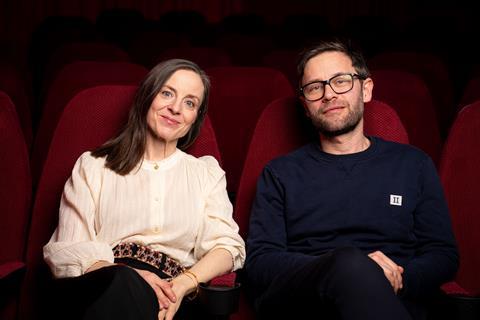
Copenhagen International Documentary Film Festival (CPH:DOX, March 13-24) is reaching beyond the Danish capital for its 2024 edition.
The festival is launching an audience initiative named Dox:Denmark, that will bring local editions of the event to municipalities around the country in partnership with regional organisations.
Trialled last year with nine regional events, it expands to 42 ’mini-fests’ this year.
“There are 98 municipalities in Denmark; we’re not stopping until we have a festival in each and every one of these towns,” says CPH:DOX artistic director Niklas Engstrom.
“We work to bring out the gospel of documentary film. We’ve done it in Copenhagen and been rather successful,” says Engstrom. “But it takes time to build up a culture of watching documentaries together in cinemas. Now we want to bring that gospel into the rest of Denmark.”
Each regional event has its own name, including Viborg:Dox and Aarhus:Dox. Copenhagen Film Festivals (CFF, which runs CPH:DOX) has a registered trademark for the :dox branding; but the execs recognise it as a widely used suffix for the non-fiction community.
The expansion taps into what Engstrom describes as “one of the polarising topics of today”, the conflict between urban and rural areas. “It’s important that cultural events cater for satisfaction outside big cities,” he says. “The festival should be a democratic event, not only for people in Copenhagen.”
Katrine Kiilgaard, CFF managing director, says the festival’s costs have increased by 50% in the two years that she and Engstrom have been running the event. The Dox:Denmark expansion has received support from cross-party politicians, leading to a line in the national budget to back the initiative.
“There’s an arm’s length between the Danish state and the institutes that administer the money,” says Kiilgard, who says they are already submitting the funding applications for the 2025 edition.
Kiilgaard and Engstrom try “as good as we can” to both be across administrative and programming matters. Kiilgaard acknowledges that Engstrom is “very involved in the programming side”, while Engstrom is glad to have a colleague who is “really good when it comes to the financial side of things.”
Highlights
CPH:DOX opens tonight (March 12) with the gala screening of Max Kestner’s Life And Other Problems, screening as part of the flagship Dox:Award competition which is all world premieres. The programme also includes the world premiere of James Rogan’s documentary Abba: Against The Odds, backed by broadcasters from the European Broadcasting Union; and the international debut of Peter Ettedgui and Ian Bonhote’s Sundance hit Super/Man: The Christopher Reeve Story.
A thematic focus titled ‘Body Politics’ will explore how society envisions the normal body. Three filmmakers with titles in the festival have put their faces through a 3D generator, creating a composite image that is on posters across the city.
In 2022, CPH:DOX screened the international premiere of Daniel Roher’s Navalny, about Russian opposition leader Alexei Navalny who died in a Siberian prison camp last month. While emphasising that he runs “a cultural festival, not a political organisation”, Engstrom adds “we are very much involved with the work of people fighting for freedom and human rights all over the world.”
This year’s event has a new Human Rights competition in collaboration with Denmark’s Institute of Human Rights, with a programme that takes in “each and every individual’s right to live an independent life”, both in Europe and further afield.
On the industry side, new projects from Danish producer Signe Byrge Sorensen, and UK producer Kat Mansoor will be showcased as part of the Forum programme in CPH: Industry, taking place next week from March 18-22.
With their greater proximity to reality, documentary festivals have been at the sharp end of the industry’s response to the Israel-Hamas war, as evidenced by protests and statements issued throughout International Documentary Festival Amsterdam in November.
“We have tried to prepare the team for all kinds of issues that could happen,” says Engstrom. “It’s been enormously important as a whole festival team to talk about our values. As long as you know what your values are, then are much better prepared when any crisis happens or criticism comes along.”

























No comments yet